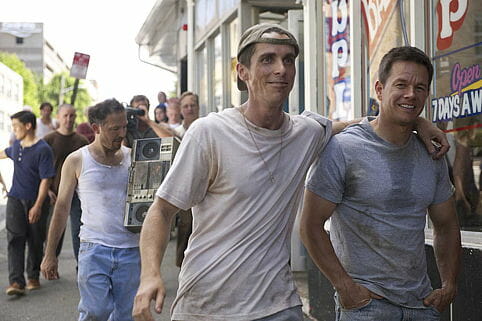By Jim Rohner · December 20, 2010

You've seen The Fighter already, right? There's a scrappy, underdog protagonist hailing from a less than privileged neighborhood trying to overcome the odds and prove to himself and others around him that he can be the best (fill in the blank). Come to think of it, haven't we already seen this from Mark Wahlberg before? Three times, actually? First there was Boogie Nights, then there was Rock Star and then there was Invincible. Add to that, the fact that this is based on the true story of "Irish" Micky Ward" and, yeah, it's understandable to assume that you've seen The Fighter before. But I can definitively say that no, you haven't seen The Fighter before because you've never seen this story as told by David O. Russell, and that makes all the difference.
Admittedly, many elements of this story are entirely familiar. Ward (Wahlberg) is a boxer from working class Lowell, Massachusetts living in the shadow of his half-brother and sparring partner, Dicky Eklund (Christian Bale). Dicky is known as "The Pride of Lowell" because he once knocked down Sugar Ray Leonard during a bout in 1978. It's for this reason that Dicky believes he's being followed by a film crew. In actuality, they're shooting a documentary about crack addiction. The crippling addiction frequently makes him late for training sessions and adds tension to already dysfunctional family ties between him, Micky and their mother, Alice (Melissa Leo), who also acts as Micky's manager.
Compounding the problem is the fact that Ward is frequently booked in losing fights. A potential solution arises when he's offered the chance to train in Las Vegas, but he'd have to leave his family behind to do so. The choice is clear to Ward's girlfriend, Charlene (Amy Adams), who is already despised by the seven – yes, seven – Eklund sisters, but not so clear to the meek boxer. Dicky has taught Ward everything about the sport and continues to do so once in prison, offering advice that enables his half-brother to win a fight that sets him on a course for title contention.
And therein, as the bard says, lies the rub. The screenplay for The Fighter does not set Ward up as simply a Rocky-esque underdog that needs to overcome impossible odds, but instead writes him as an indecisive everyman who is confronted with the unenviable task of choosing between those he loves and those who'll help him succeed. Most of the time Ward's desires are worlds apart from the Eklunds' and the scenes in which these two opposing aspirations collide are the most emotionally charged and powerfully acted because of the latent fear coming from Ward and Alice. They say hatred is an extension of love, and it's infinitely fascinating how Ward and Alice's individual fears of loss and misguided love for each other devolve into scenes of verbal and even physical confrontation.
Such scenes ensure that the audience is constantly aware exactly what's at stake with each decision Ward makes, and it's this heavy-hanging cloud that emotionally drains the audience in the best possible way. Aiding this feeling are the performances Russell coaxes from his actors. Bale is already being mentioned as a shoe-in for a Best Supporting Actor Oscar and deservedly so as his portrayal of brokenness and self-delusion is so much deeper than just emaciation and a Boston accent. Matching him is Melissa Leo with a fantastic depiction of a woman who is not ill-willed, but who has been so convinced of her own value for so long that it hurts her at a core level to hear otherwise. Praise should also be heaped upon Amy Adams and Mark Wahlberg, the former of whom disproves any accusations of one-dimensionality and the latter of whom fits comfortably into a role that breaks type in its own ways.
Russell's films have always boasted strong performances; that's nothing out of the ordinary. But what does show Russell's skill as a director and differentiates The Fighter from a like-minded crowd is that the film never takes itself too seriously. That doesn't mean The Fighter shows any hints of tongue-in-cheek – far from it – but Russell never allows the film to become too oppressively serious or melodramatic by breaking it up with scenes of genuine humor. Russell recognizes the mix of comedy and drama inherent in life and makes sure that each packs equal punch.
So jettison all preconceived notions that you've seen The Fighter before. You haven't. Unless you're seeing it for a second time now that it's in wide release and if that's the case, I can't say I blame you at all.
5 out of 5 T.K.O's